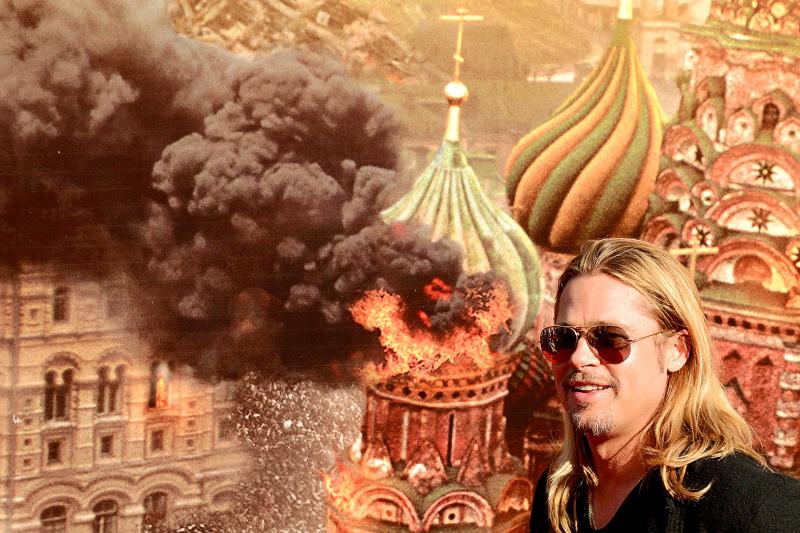The lure of the massive Chinese market has led Hollywood to readily self-censor its films to please Beijing, according to a new report by Pen America, an anti-censorship group.
Screenwriters, producers and directors in the huge US film industry are changing scripts, deleting scenes and altering other content, afraid of offending Chinese censors who control the gateway to the country’s 1.4 billion consumers, according to the report released Wednesday.
The actions include everything from deleting the Taiwanese flag from Tom Cruise’s bomber jacket in the upcoming Top Gun: Maverick, to removing China as the source of a zombie virus in 2013’s World War Z.

Photo: AFP
But it also means completely avoiding sensitive issues including Tibet, Taiwan, Hong Kong politics, Xinjiang and the portrayal of LGBTQ characters, the report said.
Faced with blacklisting and other punitive measures, Hollywood producers are even censoring films not targeting the Chinese market, in order to not impact others planned for Chinese theaters, Pen America says.
“Steadily, a new set of mores has taken hold in Hollywood, one in which appeasing Chinese government investors and gatekeepers has simply become a way of doing business,” the report said.
LUCRATIVE MARKET
Pen is a global organization which speaks out for the protection of freedom of expression for writers and artists worldwide. It says Beijing enforces one of the world’s most restrictive censorship systems, and numerous members of the group’s China arm have been jailed, including Nobel Peace Prize laureate Liu Xiaobo (劉曉波), who died in 2017 while serving an 11 year prison sentence.
Censorship is now centralized under the Chinese Communist Party’s Central Propaganda Department, which decides whether a foreign film gets access to what is soon to be the world’s largest movie market.
Only a handful of foreign films are released in China each year.
The market’s importance is clear. Hollywood films like Avengers: Endgame and Spider-Man: Far from Home< made more money in China than in the US.
“The Chinese Communist Party, in fact, holds major sway over whether a Hollywood movie will be profitable or not — and studio executives know it,” the report said.
That explained why former Disney chief executive Michael Eisner apologized to Beijing after it banned the 1997 film Kundun about the Tibetan Dalai Lama, the report said.
And Richard Gere — star of the 1997 thriller Red Corner, which depicted a corrupt Chinese justice system, and a vocal advocate for human rights in Tibet — has said Hollywood producers avoid him so as to not provoke Beijing.
Increasingly, the report said, Hollywood people “voluntarily internalize these strictures, even without being asked.”
Some even invite Chinese censors onto film sets.
One Hollywood producer told Pen: “If you come up with a project that is actively critical,” the fear is that “you or your company will actively be blacklisted, and they will interfere with your current or future project.”
Pen warned that acquiescence to Chinese censorship could become “a new normal” in countries proud of their free speech protections.
“Hollywood’s approach to acceding to Chinese dictates is setting a standard for the rest of the world,” it warned.

Most heroes are remembered for the battles they fought. Taiwan’s Black Bat Squadron is remembered for flying into Chinese airspace 838 times between 1953 and 1967, and for the 148 men whose sacrifice bought the intelligence that kept Taiwan secure. Two-thirds of the squadron died carrying out missions most people wouldn’t learn about for another 40 years. The squadron lost 15 aircraft and 148 crew members over those 14 years, making it the deadliest unit in Taiwan’s military history by casualty rate. They flew at night, often at low altitudes, straight into some of the most heavily defended airspace in Asia.

Taiwan’s democracy is at risk. Be very alarmed. This is not a drill. The current constitutional crisis progressed slowly, then suddenly. Political tensions, partisan hostility and emotions are all running high right when cool heads and calm negotiation are most needed. Oxford defines brinkmanship as: “The art or practice of pursuing a dangerous policy to the limits of safety before stopping, especially in politics.” It says the term comes from a quote from a 1956 Cold War interview with then-American Secretary of State John Foster Dulles, when he said: ‘The ability to get to the verge without getting into the war is

Like much in the world today, theater has experienced major disruptions over the six years since COVID-19. The pandemic, the war in Ukraine and social media have created a new normal of geopolitical and information uncertainty, and the performing arts are not immune to these effects. “Ten years ago people wanted to come to the theater to engage with important issues, but now the Internet allows them to engage with those issues powerfully and immediately,” said Faith Tan, programming director of the Esplanade in Singapore, speaking last week in Japan. “One reaction to unpredictability has been a renewed emphasis on

Beijing’s ironic, abusive tantrums aimed at Japan since Japanese Prime Minister Sanae Takaichi publicly stated that a Taiwan contingency would be an existential crisis for Japan, have revealed for all the world to see that the People’s Republic of China (PRC) lusts after Okinawa. We all owe Takaichi a debt of thanks for getting the PRC to make that public. The PRC and its netizens, taking their cue from the Chinese Communist Party (CCP), are presenting Okinawa by mirroring the claims about Taiwan. Official PRC propaganda organs began to wax lyrical about Okinawa’s “unsettled status” beginning last month. A Global